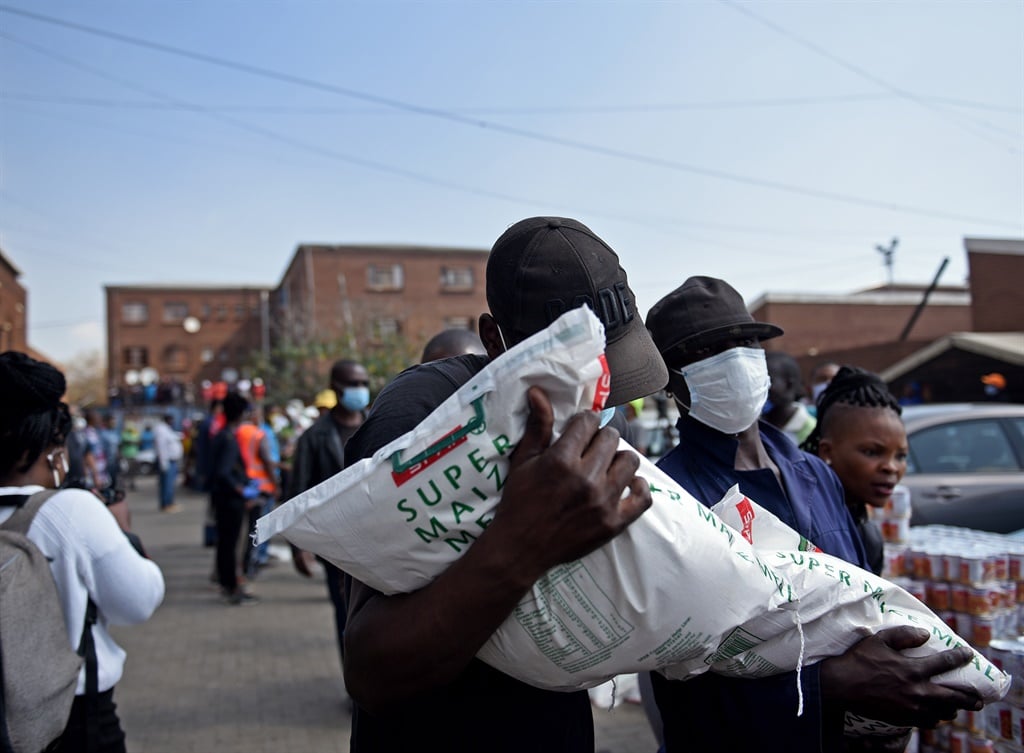
Access to food parcels for KwaZulu-Natal’s most vulnerable citizens depends on where they live, who they know and how effective local community structures are in any given area.
Community-led feeding schemes and the province’s social development department said a further challenge was assessing where exactly the need was, sifting out duplication and dealing with people who can afford their own food, but believe they are entitled to freebies.
Residents of informal settlements across eThekwini told City Press they were being overlooked or ignored by local councillors and government programmes.
Community leaders warned that one of the many unintended consequence of the prolonged Covid-19 coronavirus lockdown was worsening hunger.
Prior to the lockdown, Howick-based Matt Hogarty ran the nonprofit organisation Love Howick, which focused on community building and skills development.
Now he is coordinating the uMngeni Relief Network – a collaboration of various nonprofits, churches, businesses and farmers.
The group makes weekly deliveries – using 10 trucks and 30 packing volunteers – to distribute food to 1 900 households across all 12 wards in the uMngeni Local Municipality.
Hogarty said the system relied on information being relayed upwards through a network of ward councillors and nonprofits, which provided weekly lists of households that were in distress and desperate for food.
“Some councillors are more efficient than others. We also need to verify income, but, essentially, we provide food parcels to households earning less than R1 800 a month, so it includes state pensioners. Once we’ve met this need, we can help those over that threshold.”
Should any suspicions be reported from a particular ward about the handling of parcels, deliveries were immediately frozen, Hogarty said, until the issues had been resolved.
He said the key to avoiding any potential fallout in a time of crisis had been to include “everyone” and “keep everyone on board”.
This practice resulted in the network being given a seat on the province’s joint command council.
READ: Hunger stalks villagers as they struggle to survive in face of Covid-19
“Because we have no government funding, we call the shots. But we need help from local government to provide information and verify details. The government doesn’t handle the distribution, we do.
“All deliveries in the wards are overseen by community-based nonprofit leaders.”
Mhlaba Memela, KwaZulu-Natal’s spokesperson for the social development department, told City Press that reaching those in genuine need required strong local leadership.
The province used its existing outreach programme, Operation Sukuma Sakhe, to access residents who needed food.
“If local leaders do their job properly [by identifying vulnerable families], it shouldn’t take more than a week to deliver a food parcel,” said Memela.
Through the national Solidarity Fund’s local partner, the Pietermaritzburg-based action development agency, food was sorted, allocated and distributed across the province.
Memela conceded that the call centres – operated by the department and the SA Security Agency – were at times “overwhelmed” with citizens wanting to register for food relief.
It was also not uncommon to find more than one member of a household asking for relief.
But the department’s assertions remained cold comfort for S’bu Zikode, president and founder of the shack dwellers’ movement, Abahlali baseMjondolo, which has reported that people are being excluded from receiving food parcels because they were Abahlali activists.
One of eThekwini’s largest and more volatile informal settlements, Kennedy Road in Springfield, Durban, had not received any food parcels, Zikode said.
Instead, residents were relying on civil society groups to get food.
eThekwini finally started delivering food hampers and vouchers for its own relief programme on Friday, five weeks into lockdown.
Qualifying residents in all of the metro’s 110 wards would receive hampers or vouchers worth R600 through the programme, which had a budget of R66 million.
Do you know of households that desperately need food but are not getting the parcels as promised?
SMS us on 35697 using the keyword FOOD and tell us what you think. Please include your name and province. SMSes cost R1.50. By participating, you agree to receive occasional marketing material




 Publications
Publications
 Partners
Partners









